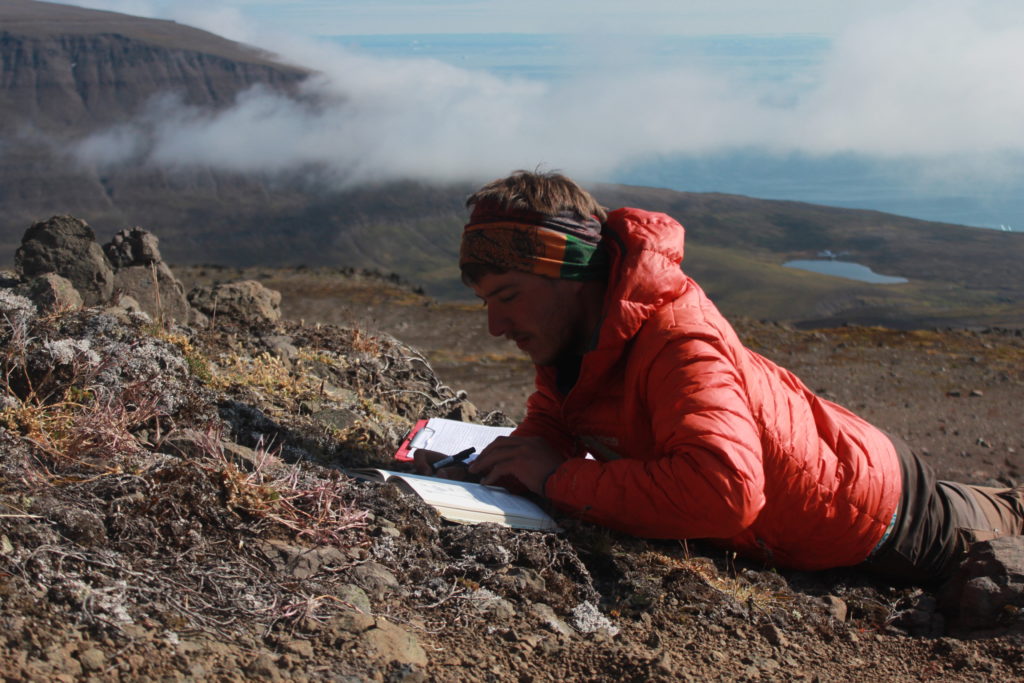Hej! My name is Jonathan, and I am a vegetation ecologist with a particular interest in how plants drive interactions, both within populations and communities as well as across trophic levels. As such, I find a likewise fascination in the question why plants occur in a given location as well as how their occurrence alters the local and regional biotic and abiotic environment. Having started my path into ecology from classic botany, I now focus primarily on the ecosystem effects of vegetation – even though I spent a significant part of my last summer lying on the tundra and trying to discriminate 2-mm petals of tiny arctic herbs.
The reason for that arguably special – but memorable! – summer activity is my PhD project in the Vegetation Dynamics Group at Aarhus University, Denmark, in which I study Greenlandic shrub-dominated plant communities and their effects on local microclimate. Specifically, I am trying to disentangle drivers for the abundance of single shrub species along a coast-inland gradient, to infer vegetation controls on temperature profiles, soil moisture, and decomposition in tundra vegetation, and to map microclimates at the landscape scale, integrating local measurements, drone data, and ecosystem modelling. Hopefully, this will allow for more precise predictions of global change impacts on arctic vegetation and inform about potential microrefugia for species persistence.
The above-mentioned term of ‘vegetation controls’ links tightly to plant functional traits, or perhaps more precisely, effect traits. In order to obtain a quantitative estimate of canopy structure, we measured a variety of leaf traits and heights. However, since I have not previously worked with trait data, I am sure the upcoming course will provide new input for me in handling trait data and assessing its possibilities and limitations. I also hope I will be able to apply some of the workflows to my own analyses.
With their steep gradients – both in terms of slopes and environmental conditions – mountains have fascinated me since my early childhood. I consider myself very lucky in that I already had the opportunity to work and travel in mountainous areas in a variety of countries and across multiple continents, and the cloud forest of the high Andes will surely add another memorable experience. Yet, the course will merge my previous research experience with fire ecology, which is a completely new field to me, but definitely exciting. Also, it’s great that all the teachers invest so much effort and time to share their knowledge and to provide us with the opportunity to benefit from their experience. This reflects one thing that I especially like about the ecological scientific community in general: the uncomplicated approach that many – if not most – ecologists take when interacting with each other, putting standing or academic merits second.
The comparison of the perception of climate change between Peru and my home country, Germany, is certainly an interesting matter. As most of Peru’s territory is located at high altitudes, which are disproportionally affected by rising temperatures, I would anticipate that processes related to climate change such as glacier melt are more visible than in most other countries. Consequently, I would assume that people are very much aware of the changes happening, at least on a local, but sometimes also on a global scale. For instance, I remember reading about a Peruvian farmer filing a lawsuit against the German energy company RWE (the case is still ongoing). I have the general impression that awareness – albeit maybe not profound scientific understanding – for climate change is higher in relatively poor countries that are immediately and strongly affected by its consequences, and the same seems to be the case for the anthropogenic causes, although those people contributed the least part.
In contrast, in Germany, one of the highest developed industrial countries, I would say that people are generally aware of climate change, and also of the anthropogenic contribution. Yet, most of them do not realise the importance to change their personal behaviour, first because they rarely experience any changes themselves, and second because their wealth and technological development allow them to. Politicians are not contributing to change this view either by perpetually preaching technology as the major solution to the climate crisis. Still, awareness has been growing, especially over the last year with the Fridays4Future movement receiving more and more attention and support, but much more dissemination work will be needed to make people aware of how every individual could contribute to mitigating climate change.
